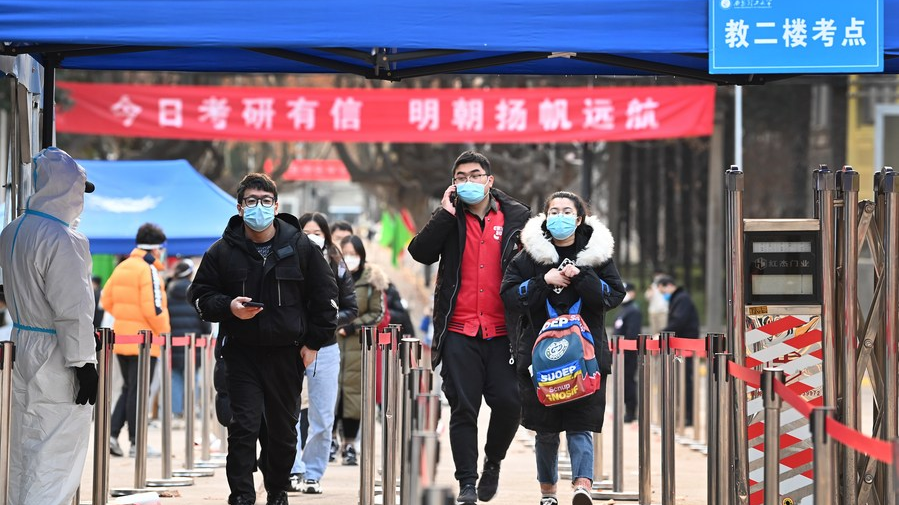02:37

After checking the result of her National Postgraduate Entrance Exam (NPEE), 22-year-old Lin Hong knew she needed to find another way out.
Lin was among the tens of thousands of undergraduates who took the exam required for enrolling in postgraduate study for all students in the Chinese mainland. While China is seeing a record number of over 10.7 million new college graduates this summer, the job market has been struggling to keep up with a surplus of graduates. Meanwhile, a recent resurgence of COVID-19 has brought unprecedented disruptions to the economic growth in major cities, including Shanghai, leading to an extra-difficult job-seeking season.
Although the overall urban unemployment rate eased slightly to 5.5 percent, the unemployment rate among 16-to-24-year-olds climbed to 19.3 percent in June, hitting an all-time high since the National Bureau of Statistics began publishing this monthly indicator in 2018.
Faced with the mounting employment pressure, more college graduates in China are considering postponing their careers while continuing to pursue more advanced college degrees. Over half of graduates consider taking the NPEE, and nearly 30 percent of the graduate students would like to continue studying for a Ph.D., according to the 2022 report by 51job, Inc, a Shanghai-based human resource services provider.
Among all 113 undergraduates from the Department of Electrical Engineering of Tsinghua University, 94 students enrolled in postgraduate study, accounting for 83 percent. Meanwhile, nine students decided to study abroad, and four students have found jobs, according to Yu Qinjie, a professor from the department, at the 2022 graduation ceremony. Last year, eleven students went directly to the job market.

Examinees leave a venue of the postgraduate entrance exam at Xi'an University of Technology in Xi'an, northwest China's Shaanxi Province, Dec. 26, 2021. /Xinhua
Examinees leave a venue of the postgraduate entrance exam at Xi'an University of Technology in Xi'an, northwest China's Shaanxi Province, Dec. 26, 2021. /Xinhua
Apart from students who continue their studies, a large number of graduates are going to the job market with mounting uncertainties. Industries that were once the pillar of employment, such as real estate and the tutoring sector, experienced severe disruptions in recent months.
"The company I'm working at has taken downsizing strategies like cutting jobs amid the market downturn," said Cui Ying, an assistant general manager at Holwray Pharmaceutical in Beijing.
"Candidates at the interview this year have very good resumes, but with lower expectations on their salary compared to candidates last year."
According to the National Bureau of Statistics, the pandemic has also curtailed companies' ability to hire new employees.
For example, the job-hunting process has also been impeded as career fairs cannot be held in some cities. Due to the inconvenience of candidates traveling to other cities for interviews or internships affected by pandemic prevention measures, many cross-provincial interviews are held online.
Although online interviews save time and money for both employers and candidates, they can be affected by connection issues and other tech-related problems resulting in interrupted calls or frozen images.
"Some graduates became more anxious before taking online interviews," said staff in the employment office of a junior college in north China Shandong Province, who would like to remain anonymous. "Some job applicants get nervous when facing a camera or fail to catch the response from interviewers."

Career fairs in Zhengzhou, China, June 8, 2022. /AFP
Career fairs in Zhengzhou, China, June 8, 2022. /AFP
Helping graduates to find employment has been a top government priority this year. Companies that take on fresh graduates will receive tax incentives and government subsidies if they provide internship posts to graduates.
Online recruiting platforms and programs have been launched to help connect fresh job seekers and employers, especially for small and medium enterprises (SMEs). The Ministry of Industry and Information Technology has initiated a 100-day SMEs online recruitment campaign, during which 110,000 SMEs have posted more than 750,000 job openings and received over 1.2 million resumes from graduates.
In addition, some local governments offer cheap loans to graduates to encourage them to start their own businesses. Universities, as well as junior colleges, roll out measures including adding online career fairs and providing employment guidance services to help college graduates obtain work.
"We saw many candidates did a good job during the interview; however, the number of positions has been very limited in our company since the beginning of this year," said Cui. "Luckily, the government has introduced tax reduction policies as well as policies of postponing the payment of social security to help companies tide over the difficulties."
"With the volume of business increasing, we will increase the number of jobs," Cui added.
Article written by Zhong Xia
Video edited by Hong Yaobin
Cover image designed by Li Jingjie

